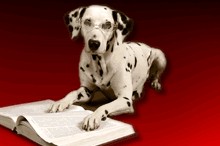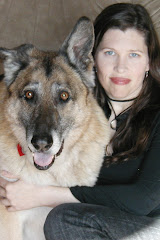“No Chew!” Article for Bay Woof Newspaper, published Feb 2008. http://baywoof.com/2008mar_gooddog.html
By Julie Bjelland Lokhandwala
webDogTrainer.com
In the world of dog behavior, destructive chewing of your furniture, shoes, and other belongings is a big no-no. Though the problem is equally bothersome whether your dog is young or old, the solution is a bit different for puppies than for adult dogs.
Puppies
Chewing is a normal part of growing up, because all dogs explore their environments with their mouths and because pups are teething. Just like human babies, pups have to gnaw and chew on objects to help cut the new teeth through the gums. Until your puppy has learned what he can and cannot chew, simply keep things away from him that you don’t want him to have, and don’t allow him into areas of the home that are not puppy-proofed unless you’re there to supervise.
It is important that you offer your puppy appropriate chew toys to help him through this phase and that you train him to use them. Keep a suitable chew toy near you at all times so that when you catch your puppy mouthing something he shouldn’t have, you can quickly redirect his chewing to the more appropriate item.
You must actually catch your puppy in the act to train him successfully. When you see him chewing on something he is not supposed to have, use a command such as “no chew,” take the item away, and replace it immediately with the toy. Offer lots of praise when your puppy takes the toy.
NEVER yell, hit, or spank your puppy for chewing or for any other reason or he will lose trust in you and is likely to develop more serious behavioral problems.
Prevention, good timing, redirection, and genuine praise are the keys to successfully preventing destructive chewing in your puppy.
Adult Dogs
In adult dogs, destructive chewing has different causes. It is usually the result of boredom, loneliness, separation anxiety, and/or lack of sufficient exercise. Dogs require plenty of time with their humans, including lots of physical exercise and mental stimulation. If you need to leave for work for the day, make sure you’ve exercised your dog well before you leave and do so again after you get home.
Dogs love to be active and busy and are not meant to be at home alone every day. If you simply cannot give your dog the time he needs, try a doggie day care center or hire a dog walker to come by a couple of times each day. How do you know how much exercise is enough? Your dog should come home and lay down to rest because you have worn him out! Practicing obedience training daily is a great way to mentally stimulate your dog.
Also, get your dog involved in activities you can enjoy together, such as hiking, biking, pet therapy work, search and rescue, agility, fly ball, herding, etc. Find out about your specific breed’s natural interests and try something new.
As with puppies, punishing your adult dog for destructive chewing will only add to your problems. If you catch your dog in the act of chewing something inappropriate, simply redirect his behavior onto something he is allowed to chew. Make sure you have appropriate chew bones and toys available at all times and praise your dog when he uses them.
Here are a few general pointers:
- To give your dog something good to chew on while you are away from home, there are specially-made chew toys that can be stuffed with kibble.
- NEVER punish your dog after the fact. If you come home and find something destroyed, there is no effective correction. Yelling or spanking the dog will only confuse him and deteriorate your relationship.
- Remember: Your dog isn’t destroying things to “get back at you” or because he is angry. This isn’t how a dog’s mind works. Dogs want to please us. If you meet your dog’s physical and mental needs and show consistency through appropriate leadership, you can successfully eliminate destructive chewing.
- Whatever his age, spend a lot of time with your dog and provide lots of love and guidance. This is how dogs learn right from wrong.
There are lots of options to improve your dog’s life and the effort will be well worth the reward of having a happy, healthy dog who isn’t destructive.
Julie Bjelland Lokhandwala is a Bay Area Dog Trainer and freelance writer. Her insightful dog-training book is featured on her interactive Dog Training Web site: http://www.webdogtrainer.com/, which allows dog owners to ask Julie questions about their dog through live chat consultations. Julie shares her home with her German Shepherd, Fax.



No comments:
Post a Comment